Jun 15, 2025 – Happy Citizens Activity Grand Festival
Hello. Today is the day when Happy Citizens from across the nation gather in one place to share cases of local practice activities, communicate with each other, and strengthen their membership with pride as Happy Citizens at the Happy Citizens Activity Grand Festival.
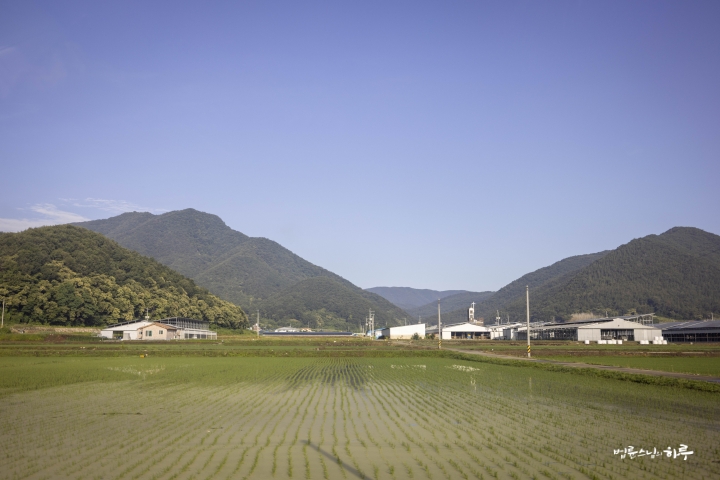
After completing morning practice and meditation, Sunim departed from Dubuk Jungto Retreat Center at 7 AM and headed to Daejeon to attend the Happy Citizens Activity Grand Festival.
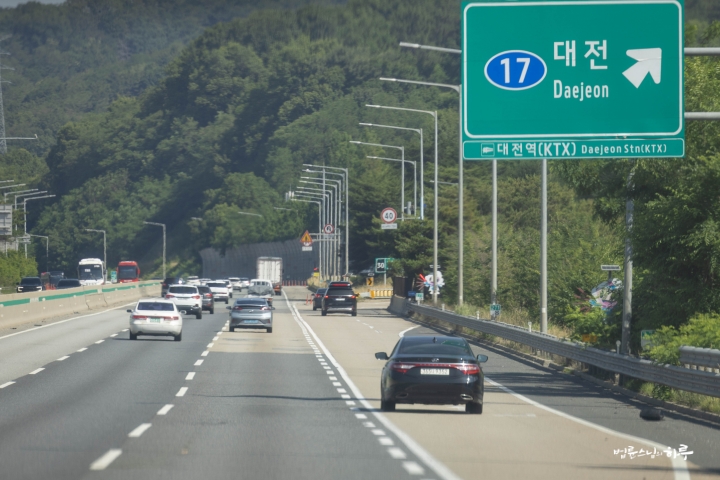
After a 2-hour and 50-minute drive, he arrived at 9:50 AM at the KT Human Resources Development Institute auditorium in Daejeon where the event was being held. Happy Citizens enthusiastically welcomed Sunim from the entrance.
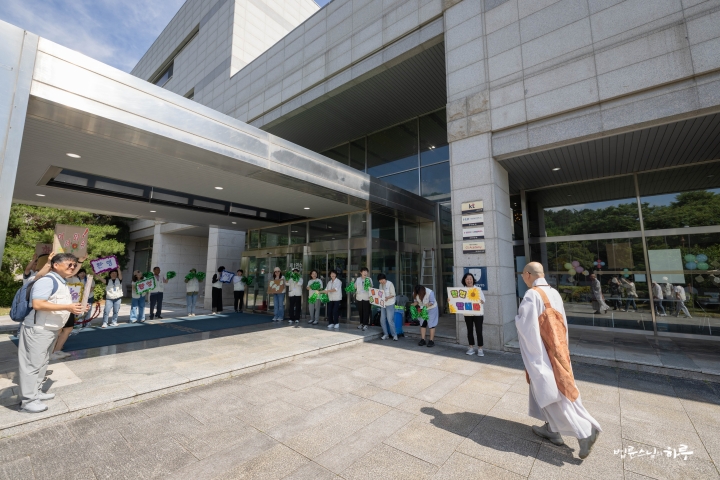
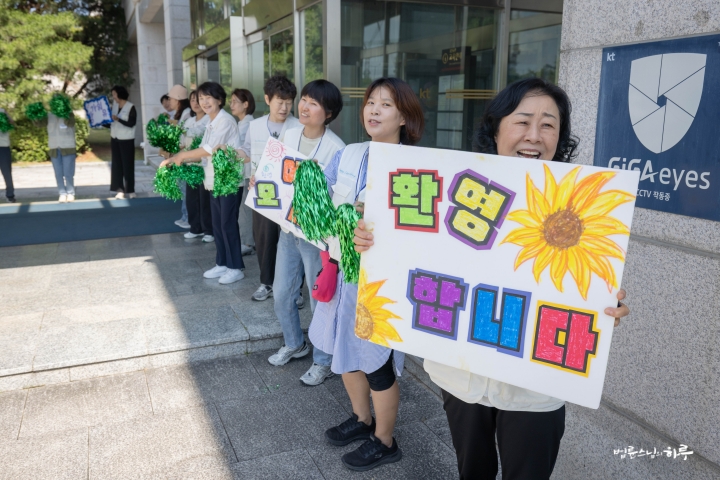
Over 750 Happy Citizens from 67 Happy Centers around the world filled the auditorium. When Sunim appeared, everyone gave him warm cheers and applause. Following last year’s Gyeongju Historical Tour, this year they gathered together at the Happy Citizens Activity Grand Festival.
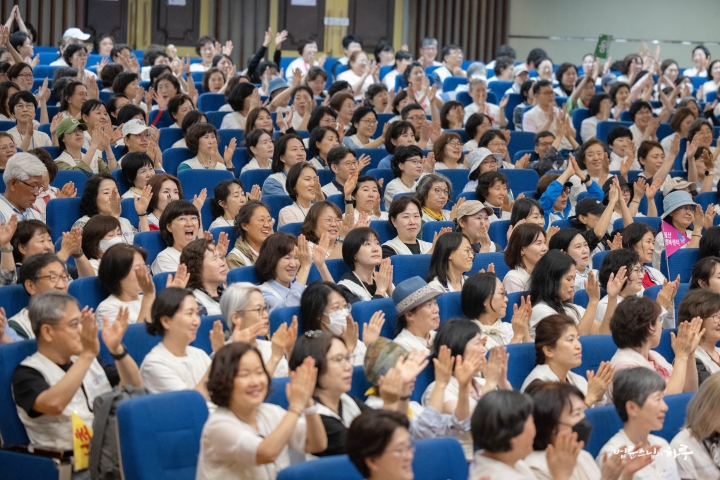
After introducing participants by 10 regional areas, the Daegu-Gyeongbuk Regional Center Union Team took the stage and performed a choral performance of ‘Beautiful World’ with choreography.
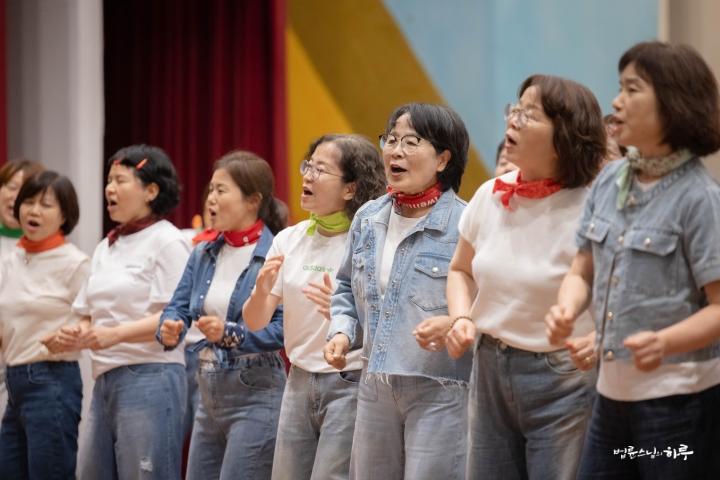
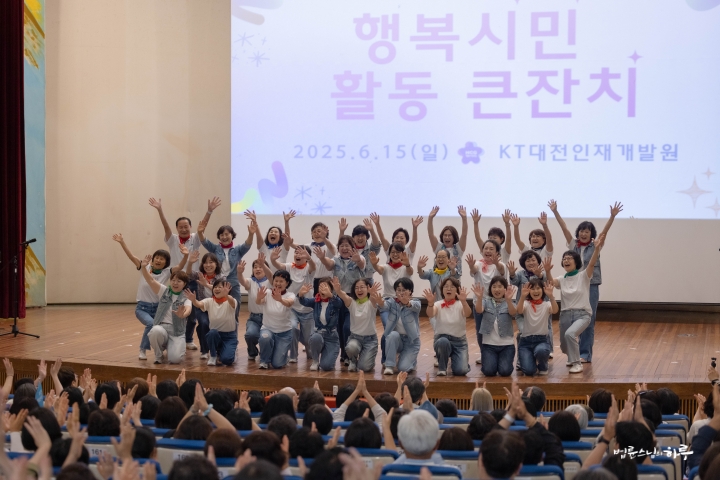
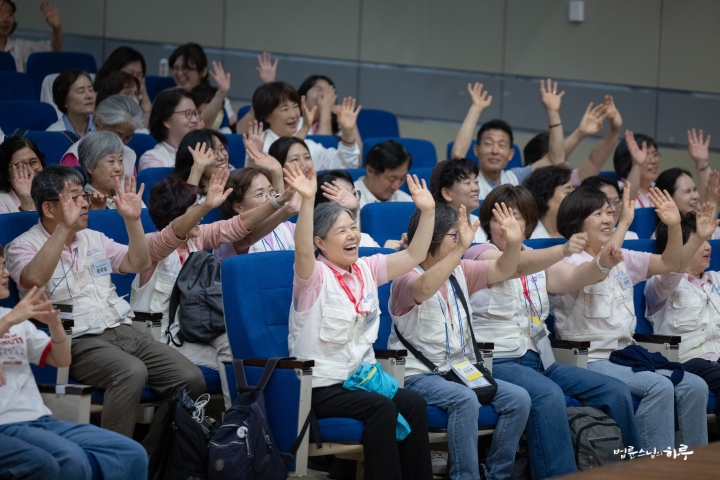
After singing together and reaffirming their commitment to create a beautiful world, Kwon Young-sun, Planning Committee Chair of The Peace Foundation, gave opening remarks.
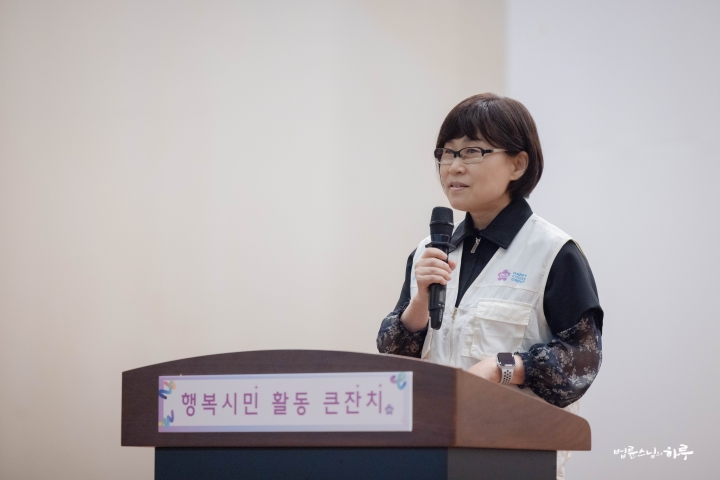
“When I came up on stage and looked at all of you, everyone’s eyes sparkled like stars. Today, June 15th, is a meaningful day when 25 years ago, the leaders of North and South Korea met for the first time since the Korean War and announced the Joint Declaration. The August 15th Liberation Day in two months will mark its 80th anniversary. I am deeply moved to be able to meet you all in person during such a meaningful year.
Happy Citizens, A Model of Global Citizens Leading K-Power
I firmly believe that Happy Citizens are the new citizen model that will lead K-Power befitting Korea’s global status. First, it’s because you are training your minds through happiness practice. I think this model of improving society through the power gained from practicing to become happy yourself is unique in the world. Second, your continuous social practice activities in the name of peace, environment, and welfare, though small in scale, are also unique globally. If you maintain these two powers of practice and action with your original intention, you will be featured in global news within the next 10 years. Let’s work together so that Happy Citizens gatherings can spread not only throughout the country but also overseas in the near future.”
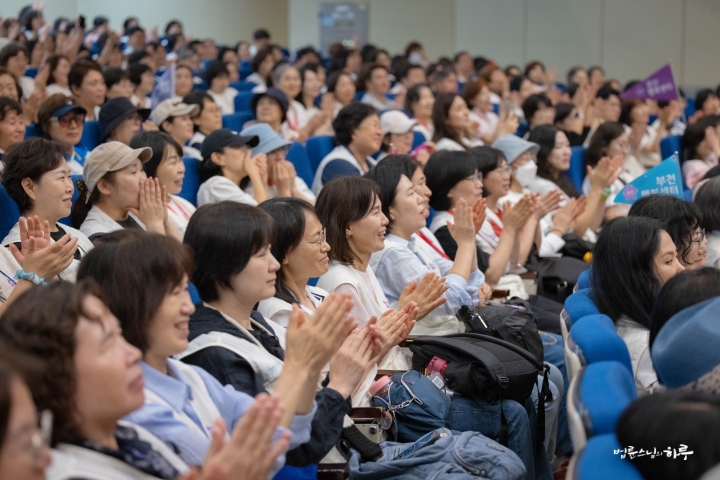
Next, Venerable Pomnyun Sunim gave welcoming remarks to the Happy Citizens gathered in one place.
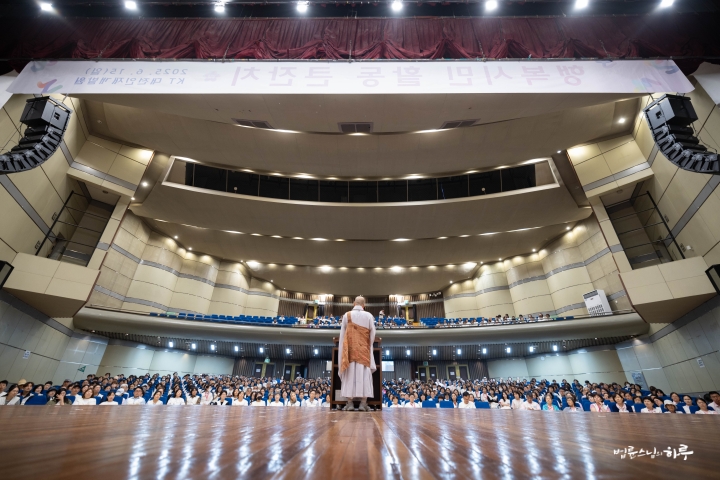
“When I watch the news in the morning these days, unbelievable events are happening one after another around the world. Yesterday, there were reports that Israel bombed Iran. The entire global village is truly falling into great chaos.
The Value of South Korea Seen Again in a Chaotic World
Since President Trump shook up the existing world order with his promise to make America great again, the world has been caught in a whirlwind of chaos. As the hegemonic competition between the US and China intensified, the weak links began to collapse first, leading to Russia’s invasion of Ukraine and the war between Israel and Hamas. In particular, a horrific war close to genocide occurred in Gaza, followed by Israel’s bombing of Iran. Like this, flames of conflict and violence are spreading across the world. Not only that, but due to natural disasters, many people in parts of Africa and Asia are still suffering from hunger due to food shortages.
Looking at this reality, we realize anew how happy and safe a country our Republic of Korea is. First, we are not in an extreme situation of starving to death. Second, racial, class, and gender discrimination are not extremely severe. Third, we are not in a situation where war is breaking out now or where we need to evacuate due to danger. Of course, many people feel economically difficult, but compared to many countries around the world, we still belong to a relatively well-off country. While some gender discrimination exists, by global standards, our gender equality and social equality indices have improved considerably.
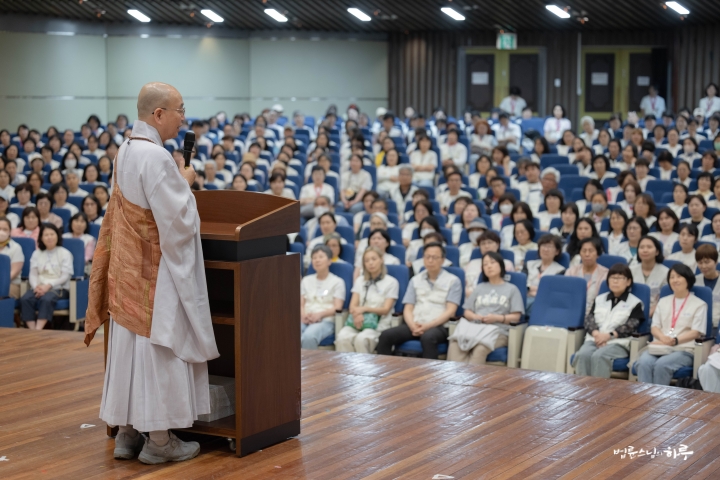
Although former President Yoon Suk-yeol made a foolish attempt to declare martial law, it was lifted in just two and a half hours. The fact that order was restored through the democratic process of presidential impeachment shows that democracy is functioning healthily. While there are elements of anxiety due to the confrontation between North and South Korea, we live in a relatively safe society with almost no threats from crime or terrorism.
From a foreigner’s perspective, Korea is a dream country, a land of fantasy. While we used to dream of visiting America, for people living in Southeast Asia or Southwest Asia today, visiting Korea is their dream. When you ask children, their first wish is to visit Korea, followed by trying Korean food and wearing Korean clothes. They also love Korean songs and dances very much.
However, we who actually live in Korea go around with frowns on our faces every day. This is the problem. It’s not something that can be solved simply through government policies. First, we need to realize what good conditions we are living in. It’s true that many people are struggling with economic downturn, family conflicts, or depression. When you listen to individual circumstances, there are understandable aspects. But objectively speaking, there’s no reason for us to live with such sour expressions. It’s truly an environment where we can live with smiles. Like the happy citizens of Daegu and Gyeongbuk who just entertained us with their songs, we should all live happily. And we should spread that happiness nationwide and even to the whole world.
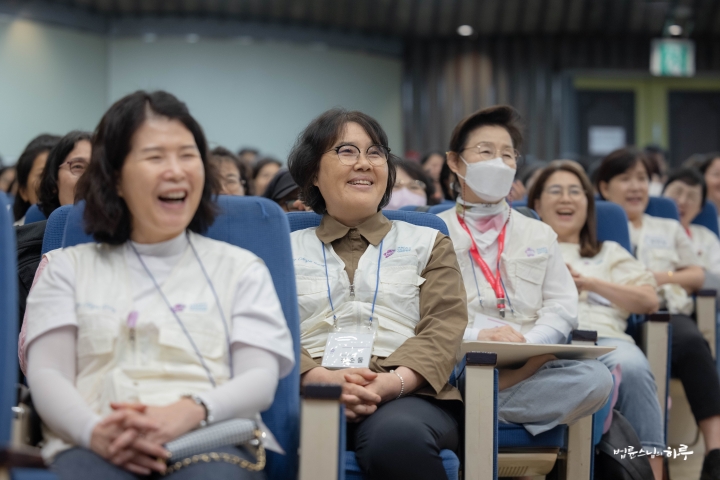
Small Actions Save the Earth and Make Everyone Happy
Of course, improving social equality and welfare indices is important. However, the most crucial factor for happiness is ‘how we manage our own minds.’ There is no faster path to happiness than making ourselves happy. In this regard, first, becoming happy ourselves and making ourselves happy is the way to love ourselves. Second, we shouldn’t stop at just our own happiness, but should share methods of becoming happy with those around us and help them become happy together. We must contribute so that our nation, and furthermore all people in the world, can become happy together. Third, we must recognize that there are still areas that need improvement. The danger of war breaking out on the Korean Peninsula still exists. What we must protect is the peace of this land. We must firmly safeguard peace so that the tragic horrors occurring in other countries do not happen on this land.
On the other side of the globe, there are still many poor people who are starving, lack drinking water, and live without homes. We must not turn away from them but have an attitude of helping and sharing even a little. And now, our one and only Earth is caught in the whirlwind of climate crisis. In this situation, what we can do is reduce consumption – that is, stop consuming and practice creating less waste. The people who have gathered to actively engage in these activities are Happy Citizens. This is a task we must undertake and a path that citizens around the world must walk together. And we must take pride in standing at the forefront of this path.
‘Let’s start by living happily with smiles on our faces.’
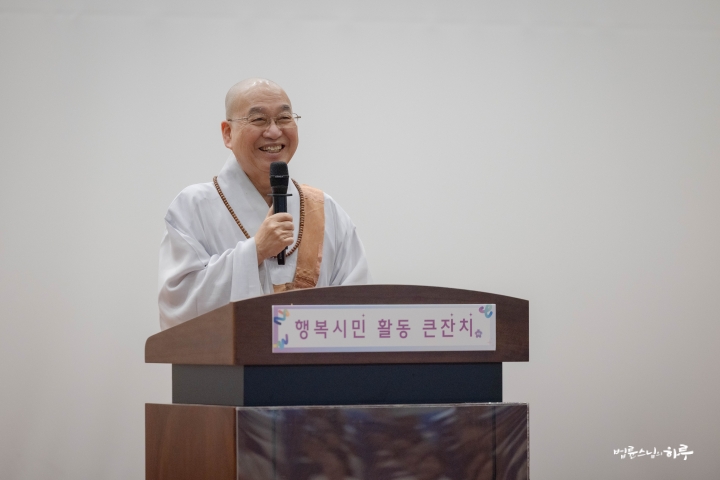
If we move forward together with this purpose, our activities will become a great hope for ourselves and all our citizens in 10 or 20 years. I hope you will deeply cherish the pride of creating such a hopeful world together. I sincerely welcome all of you who have joined us here today. Let us encourage each other and embark on this precious journey together!”
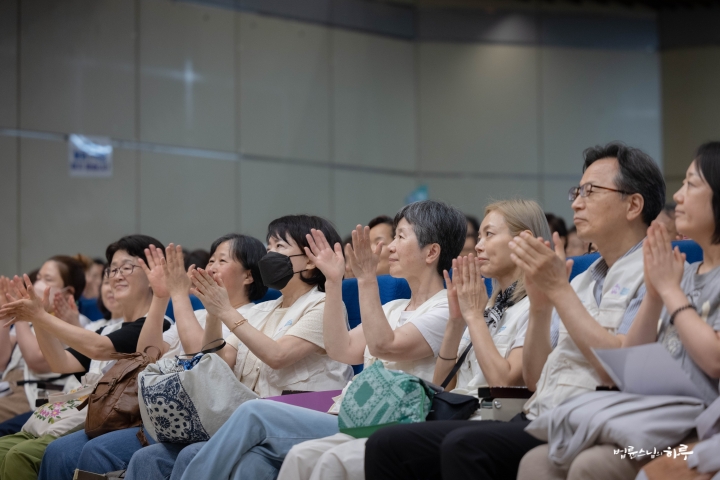
After Sunim left the stage to great applause, everyone watched a video together. The activities from 2021, when the online Happy Citizens gatherings began, until now unfolded like a panorama in the video.
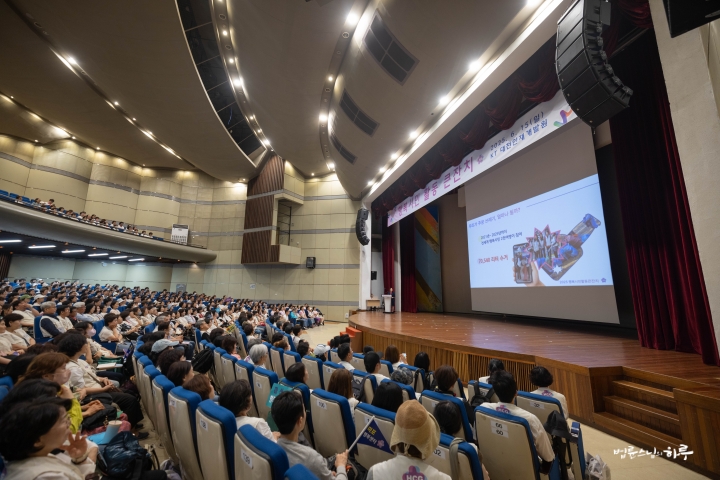
The Happy Citizens’ promise to change the world through everyday actions was becoming reality, not just a dream. Everyone gave a big round of applause to all those who had carried out various activities around the world.
Next, there was time to hear the story of Ji Yoon-kyung from the Ilsan Center, who has been experiencing various life changes through Happy Citizens gatherings.
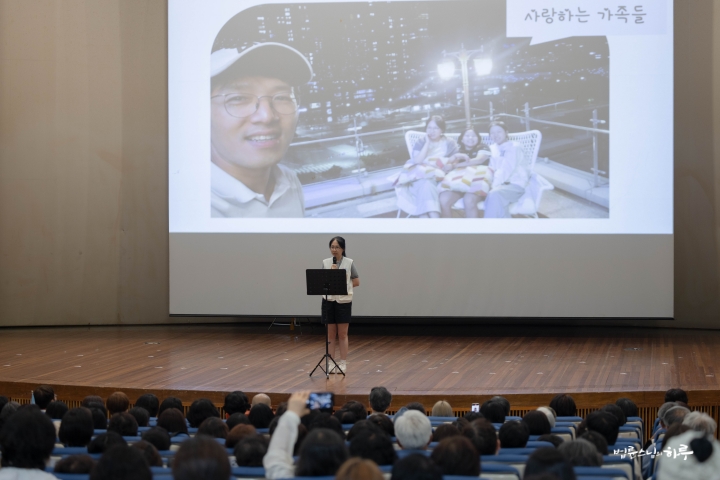
“In high school, I was a child wandering in the midst of wondering ‘Why do people live?’ I tried to find answers by reading philosophy books, going to church, and asking people around me, but I couldn’t find any answers. Later, when my father’s business faced difficulties, I put my curiosity aside for a while, thinking ‘Let me live without causing my parents too much trouble.’ Perhaps that’s why the Happiness School on the apartment bulletin board caught my eye more readily, and now I’m in my third year as a Happy Citizen.
The 17-year-old high school girl realized 30 years later through Happy Citizens activities that life is not simply about worrying about being born and dying, but about enjoying life itself, the process. So I live together with Happy Citizens and loved ones, not rushing, enjoying the process. In our Ilsan Happy Citizens gathering, we volunteer to deliver side dishes to the elderly, run settlement programs for immigrants, and participate in environmental campaigns like painting dolphins on drainage channels. It seemed like volunteer work for others, but through Happy Citizens, I learned it was ultimately a path for myself.”
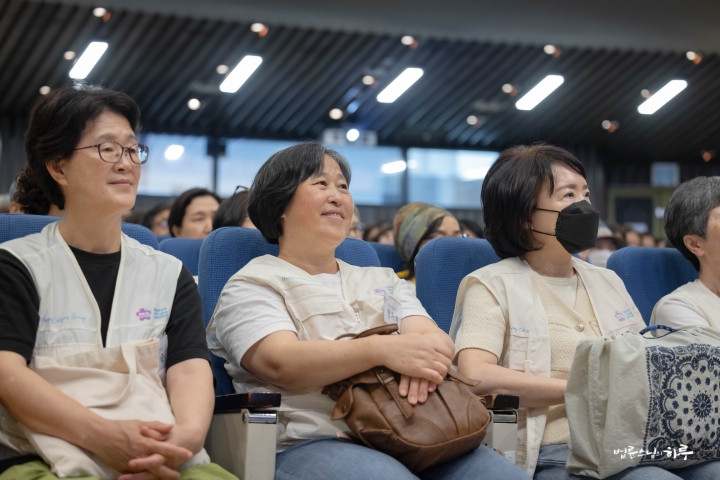
Next, they started the ‘Cheon Quiz on the Block’ Happy Citizens talk show to hear about various activity cases of Happy Citizens.
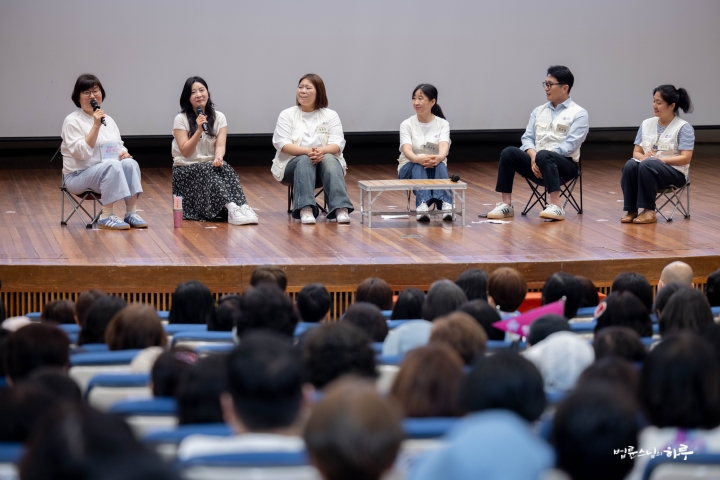
Son Mo-ah, who is active at the Songpa Center, shared her story of actively participating in history tours and local community activities.
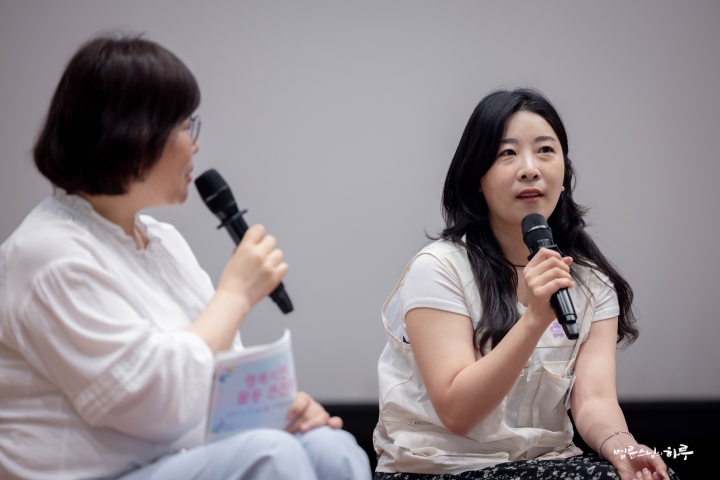
“Having lived abroad and never stayed in one place for long, I thought it would take at least a year and a half to two years to blend into the local community. But as soon as I moved to Songpa-gu, I heard about a ‘history tour’ and participated, thinking ‘If I know the history of this area, I can quickly become friends with people.’ Through that activity, not only did I learn about Songpa’s history, but my perspective on the local community completely changed. I really liked the fact that I could continue to grow even as an adult.”
Lee Yu-jin from the Gyeongsan Center introduced a touching case of actively supporting foreign worker families.
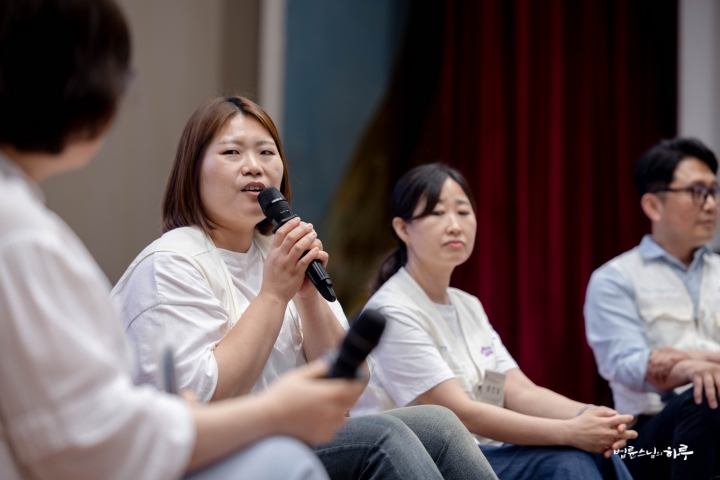
“I became connected with a Pakistani migrant worker family and started providing Korean language education and transportation support. There was a language barrier, but we communicated through eye contact, gestures, translation apps, and most importantly, sincerity. I can never forget the emotion I felt when, on the last day of class, he said to me in broken Korean, ‘Teacher, thank you.’ I felt that this small but steady activity was the beginning of social change, and I am also learning and growing a lot through it.”
The host smiled after hearing Lee Yu-jin’s case presentation and said:
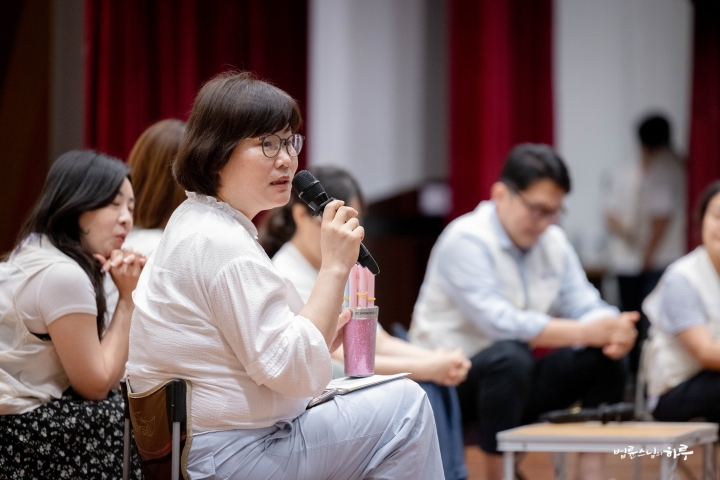
“I thought that if someone like Lee Yu-jin became a city council member, our neighborhood would really improve.”
Everyone empathized and applauded.
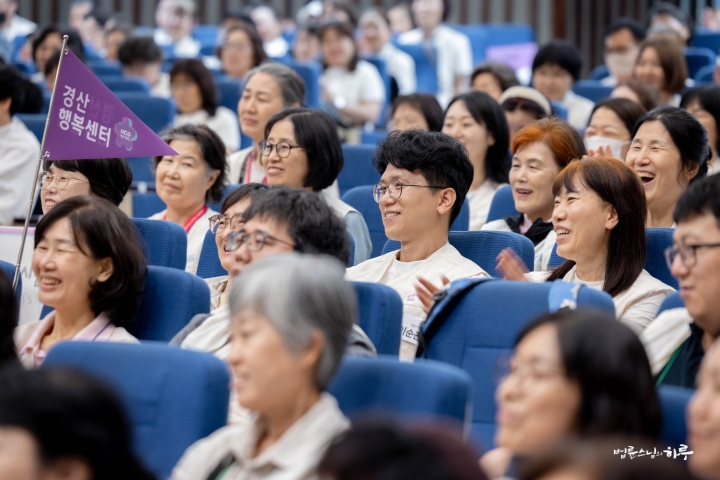
Song Seon-nam from the Bucheon Center shared a case of creating small changes through environmental campaign activities.
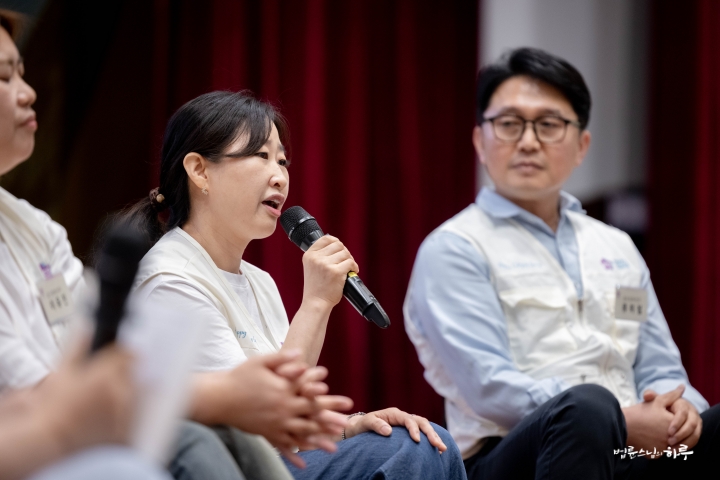
“At the Bucheon Center, we conducted an environmental campaign under the slogan ‘We are Earth Guardians, Handkerchief-Tumbler-Shopping Bag People’ to raise awareness about the severity of the climate crisis. ‘Handkerchief-Tumbler-Shopping Bag People’ refers to those who carry handkerchiefs, tumblers, and shopping bags. We prepared together through 13 meetings, going back and forth between online and offline. We organized various activities from hands-on experiences of drawing on handkerchiefs to environmental quizzes and signature campaigns, communicating directly with citizens and leading small changes. Each process was meaningful learning.”
Yoo Hee-chul from the Jongno Center talked about his happier life through Happiness School and his feelings from activities to help the homeless become self-reliant.
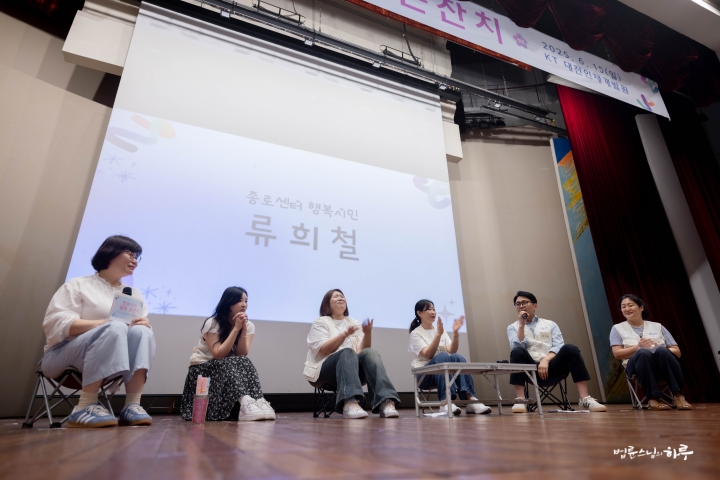
“Shortly after starting my business, sales miraculously increased and I enjoyed many things, but strangely, I wasn’t happy. Then my life changed through Venerable Pomnyun Sunim’s Happiness School, which I encountered by chance. Even the simple practice of writing three things I’m grateful for each day was difficult at first, but I came to feel grateful for small everyday things—clean air, trees, my wife’s smile. Thanks to that sincerity, I volunteered for the first time and realized that I was actually the one receiving help.
At our Jongno Center, we make and deliver side dishes once a month for women who have experienced homelessness and are now living independently. The Seoul Metropolitan Government provides villas with room and board to help them become self-reliant, and we share food with those residents while sending small encouragement. I also started volunteering for the first time through this activity. At first, I wondered ‘What can I really do?’ but after participating several times, I felt that I was actually receiving comfort and help.”
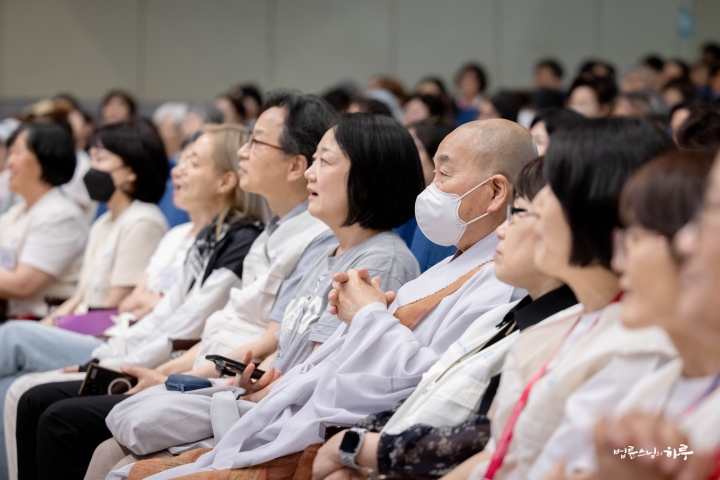
Jung Se-yeon from the Jeju Center introduced cases of actively conducting tumbler usage campaigns and marine environmental protection activities.
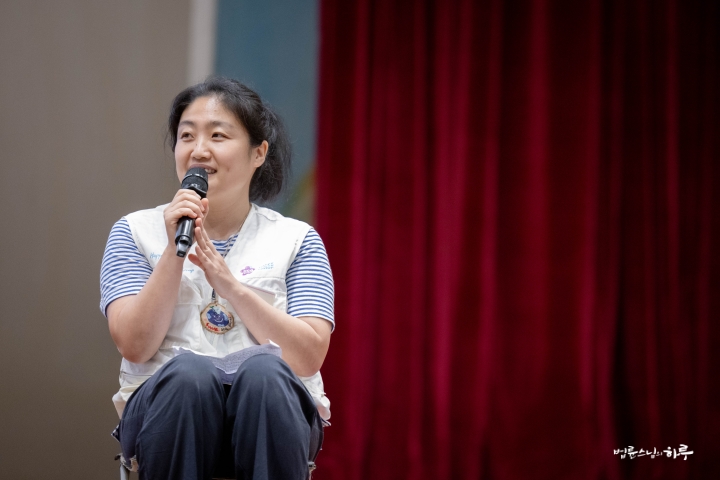
“Unlike the image of clean Jeju, the coastline was littered with all kinds of trash from cigarette butts to refrigerators. So we planned a ‘Tumbler Sharing Campaign.’ We received donations of unused tumblers, cleaned and disinfected them, and distributed them. We conducted campaigns in areas with concentrated beachside cafes. Our four-year-old child shouting ‘The ocean is hurting because of trash!’ became a hot topic and attracted many participants. We’ve been conducting this at the same time and place for three years, experiencing the changes in Jeju’s coastline together.”
I had no idea that small practices could create such resonance. The changes brought by small everyday actions were truly moving.
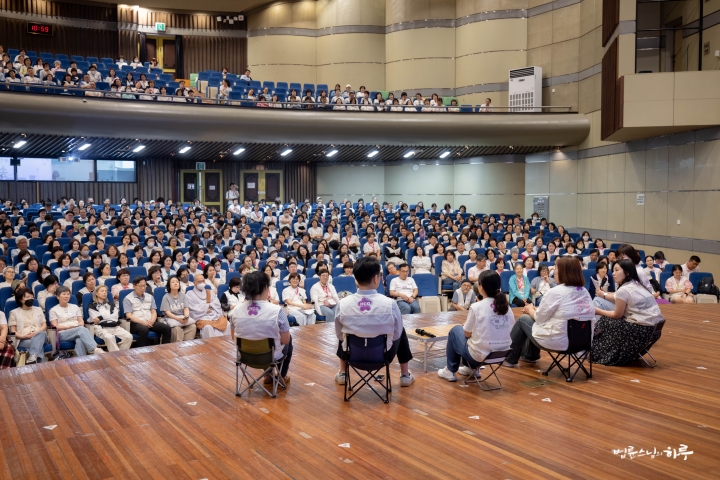
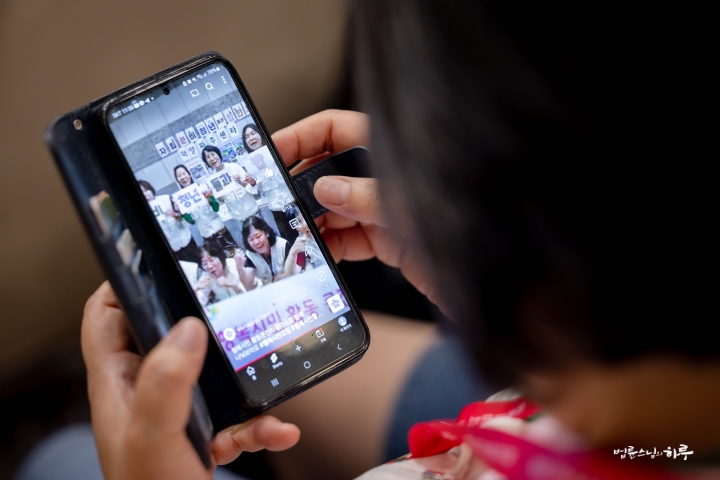
After finishing the talk show, there was time to comment on a shorts video sketching the morning event. After the joint action time, the host Cheon Hye-kyung gave a surprise quiz and presented gifts to the audience.
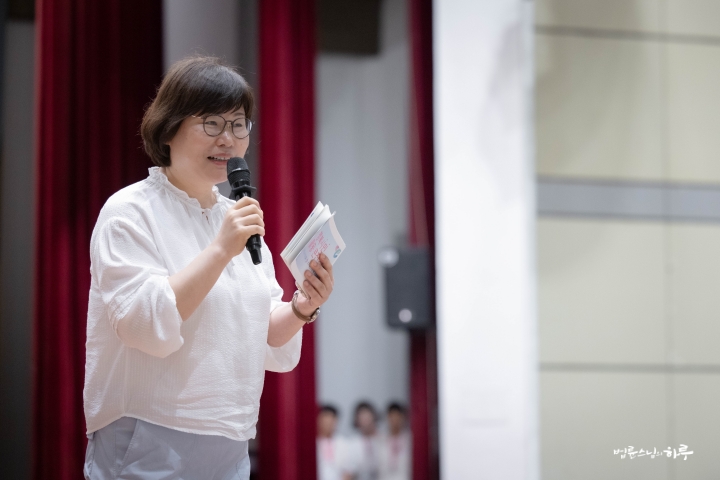
“‘You Quiz’ is very popular these days, isn’t it? Which is more fun, You Quiz or Cheon Quiz?”
Happy Citizens shouted and buzzed, saying ‘Cheon Quiz!’ and ‘You Quiz!’
“The answer is ‘Cheon Quiz is more fun!’ You Quiz is a story on screen, but Cheon Quiz is a real story that you and I create together!”
Joy and warm afterglow spread across the Happy Citizens’ faces.
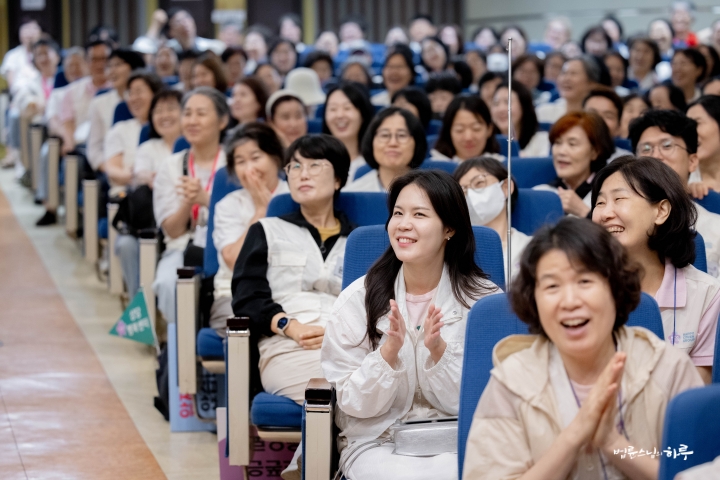
Leaving the pleasant time behind, Sunim came up on stage and gave closing remarks to wrap up the first part of the program.
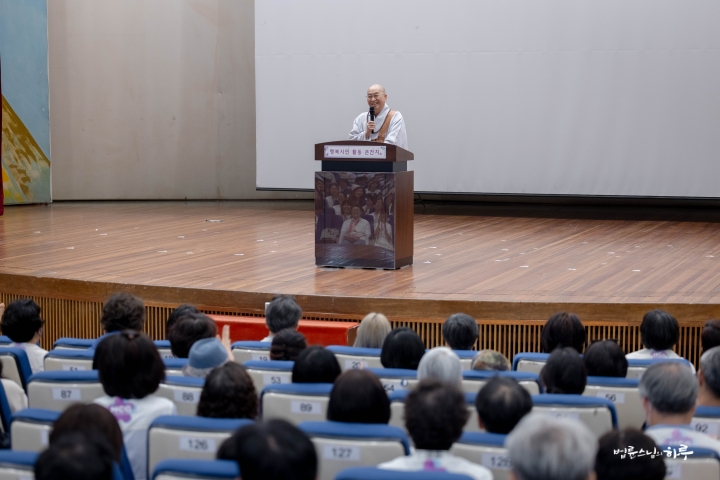
“I was deeply moved listening to the stories of these five people. They were excellent examples showing how small citizens’ practices can change the world. There’s an old saying, ‘Many a little makes a mickle.’ When small practices accumulate one by one, they eventually lead to big changes. There’s a similar analogy in the environmental movement. American meteorologist Edward N. Lorenz said, ‘A butterfly flapping its wings in Brazil can cause a tornado in Texas.’ What we’re doing now may look like a small butterfly’s wing flap, but its ripples can lead to big changes that shake the world.
Small Practices Change the World, the Wing Flaps of Happy Citizens
The host just said after seeing the Happy Citizens’ activities that ‘I wish they would become city council members.’ If you act like this, you can easily become a city council member and more. If the party nomination system were abolished when electing heads of local governments or local council members, it wouldn’t be difficult for anyone here to become a city council member. In the current structure that maintains the party nomination system, even local councils find it difficult to escape from being servants of political parties. What does it matter which party our neighborhood representative belongs to? What need is there for party nominations to solve problems like how to clean up neighborhood trash or how to maintain village roads? I think the party nomination system should be abolished at least for local councils in the future. Then people like you who have been active in the community for a long time can become city or county council members.
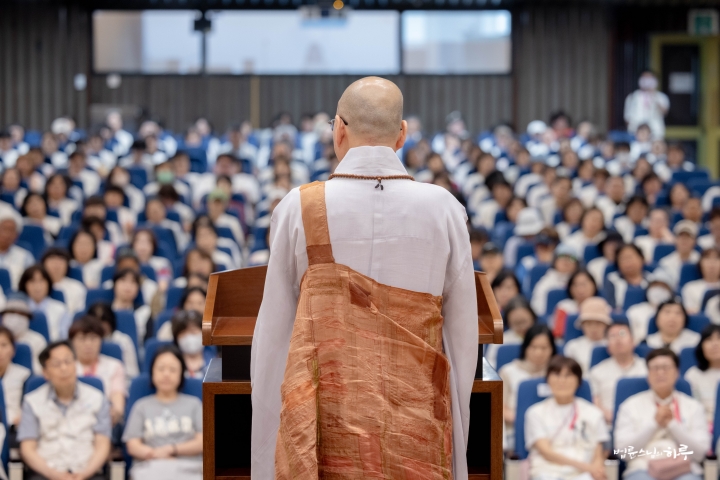
Currently, becoming a member of parliament comes with a high salary and various privileges. However, in the future, this should change to a volunteer position like in other countries. If the role transforms into a service position where people maintain their own careers while serving their communities without a separate salary, Happy Citizens would be the most suitable candidates for this purpose. They would also gain some authority to make decisions on public policies. In fact, current NGOs gather voluntarily but lack decision-making power. On the other hand, government officials and civil servants have decision-making authority but often lack voluntary spirit. If this system changes to provide both voluntary participation and decision-making power simultaneously, grassroots democracy could take root much deeper and wider than it does now.
If such changes actually occur, the Happy Citizens Movement would grow into an even more influential movement that transforms local communities. However, saying ‘It would be nice if that happened’ is similar to saying ‘I’ll be rich when ships come to Incheon port.’ We cannot change anything with vague expectations alone. What’s important is to practice what I can do right now.
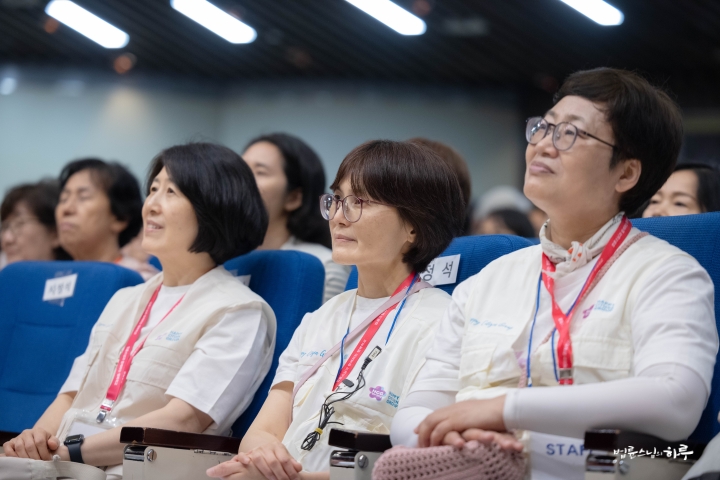
Happiness Begins with Self-Reliance and Is Completed by Helping the World
Didn’t all the presenters who just spoke seem happy? When you appear happy and do something meaningful for the world, you develop pride and self-esteem as someone who is useful. Conversely, if you only receive help from others, life may be easier, but your self-esteem diminishes. The pets we keep at home receive affection but lack self-sufficiency. They cannot survive without their owner’s help. However, wild animals, though their lives may be harder, live by their own strength. This is because they have self-reliance. While we receive parental protection when young, we must become independent as adults. Living as an adult means being self-reliant beings who help each other. If one side only gives help while the other only receives, it’s difficult for the receiving side to maintain self-esteem.
That’s why the motto of Happy Citizens is ‘Start by making myself happy, then help others be happy too.’ First, I must be happy, and then I should contribute small acts of help so others can also be happy. Furthermore, when we become people who are useful in making the world more just and peaceful, we finally develop pride. Regardless of education, economic status, position, or gender, self-esteem emerges when I have some usefulness in this society. All of you Happy Citizens gathered here today are already playing important roles in the world, regardless of age, position, or gender. That’s why I believe you are more confident and happy than anyone else.
Happy Citizens, a Happy Citizen is someone who loves themselves and knows how to make themselves happy. And based on that happiness, they live as useful beings in the world. Let’s walk this path together. Thank you to the five presenters today for being our models and examples.”
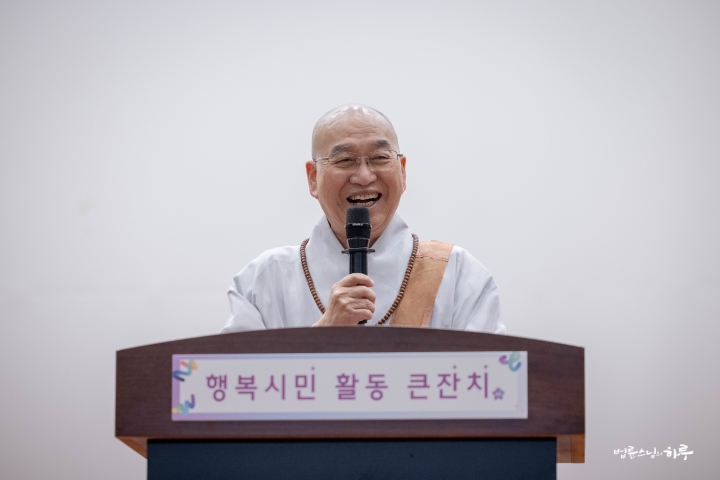
The Happy Citizens felt great pride after hearing Sunim’s words and responded with applause.
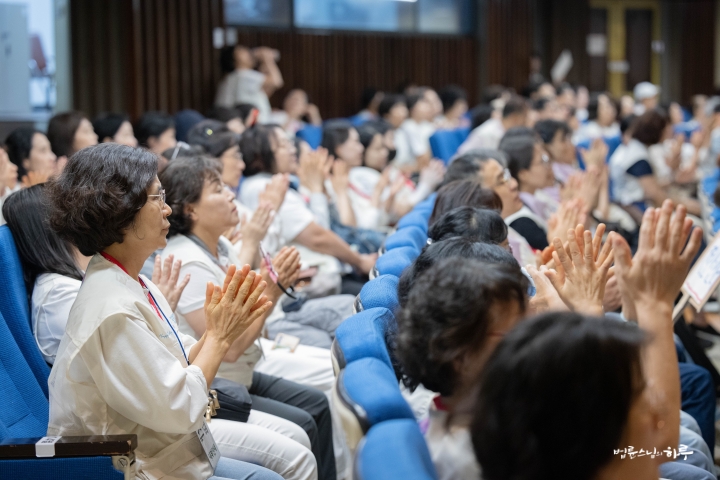
After taking a group photo together, they had lunch.
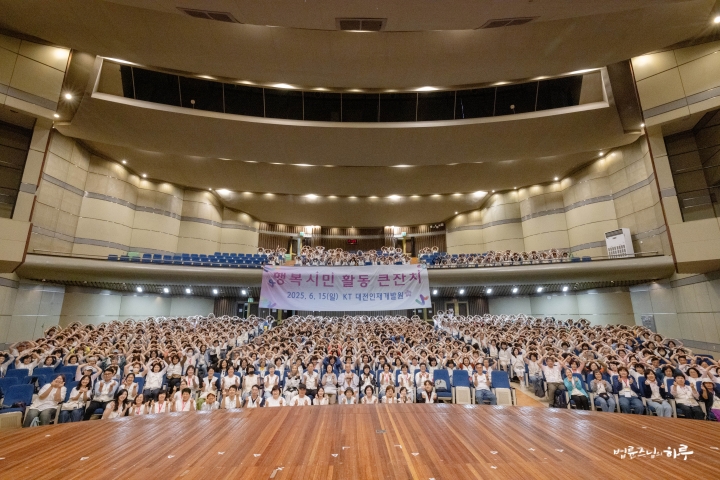
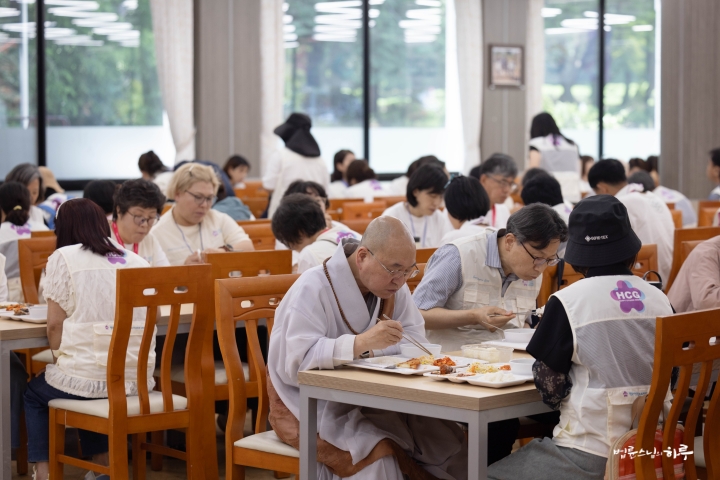
After finishing their meal, the Happy Citizens experienced various booths prepared by centers from across the country. Thirteen booths were set up in the main hall lobby, where participants could enjoy diverse activities according to their interests, including environmental practices, peace prayers, sharing activities, and history quizzes.
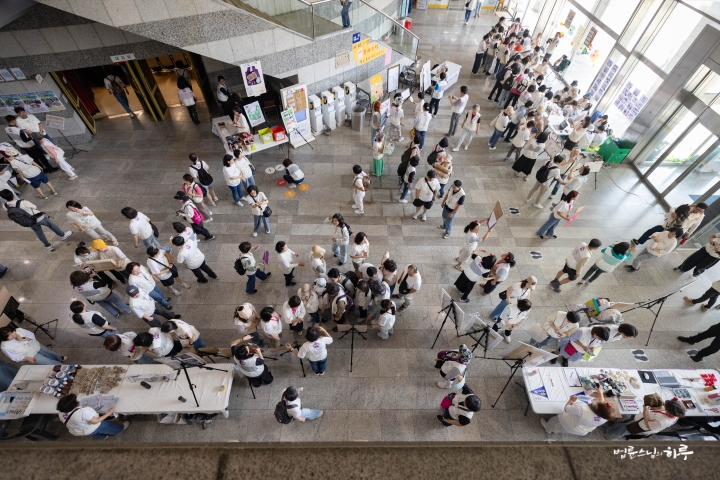
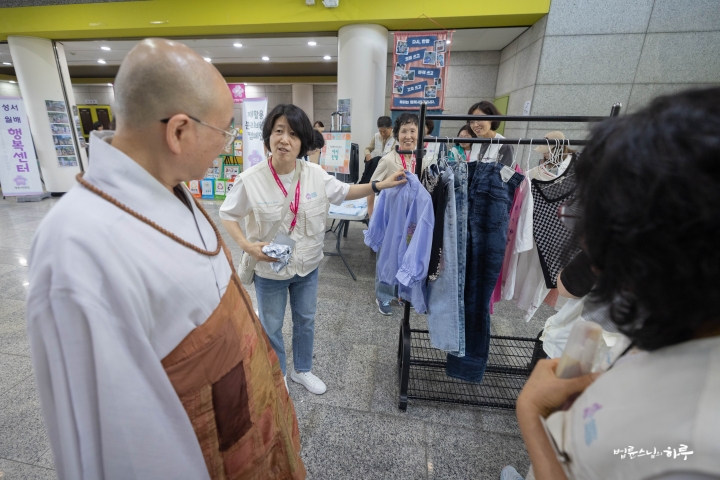
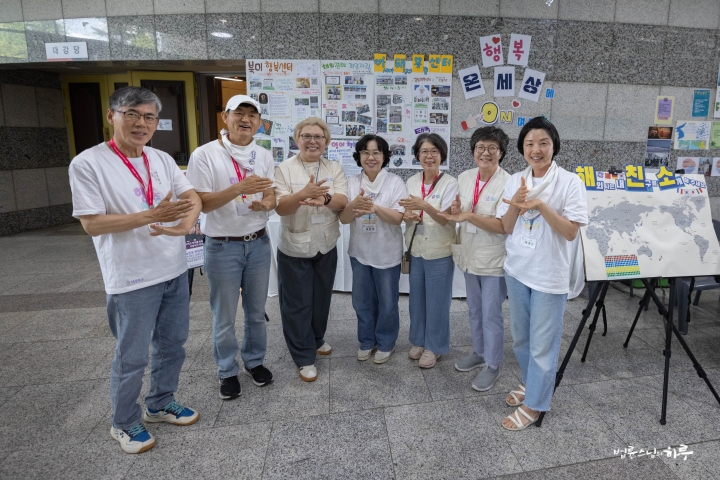
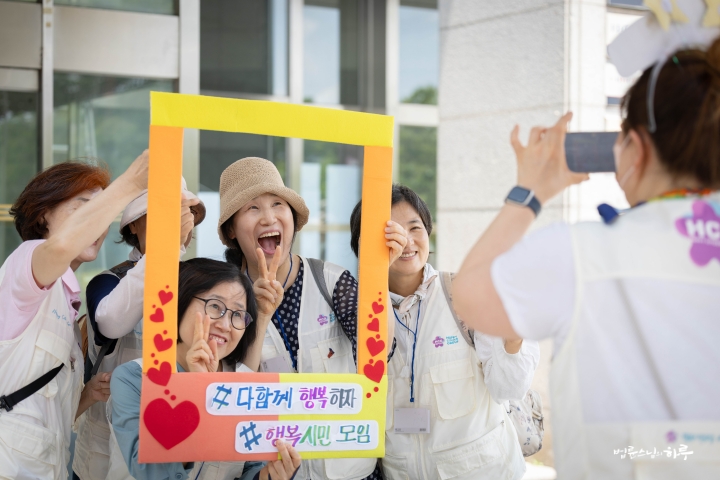
An hour passed quickly as they made their way through various booths, including hemp scrubber knitting, eco-friendly detergent making, campaigns to eliminate microplastics, and recycling separation campaigns.
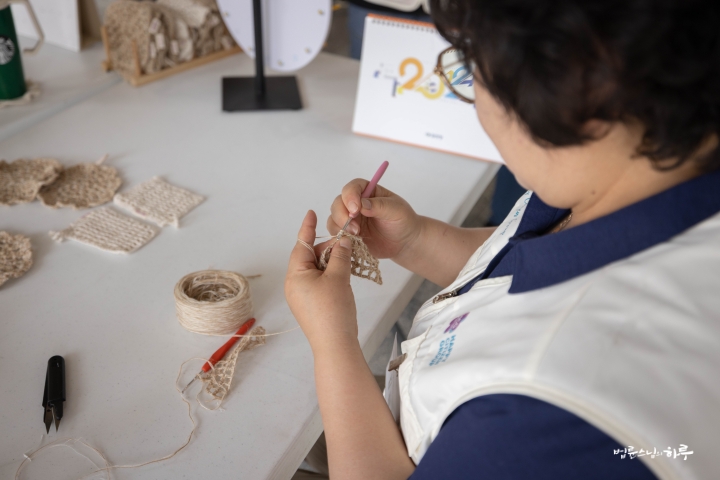
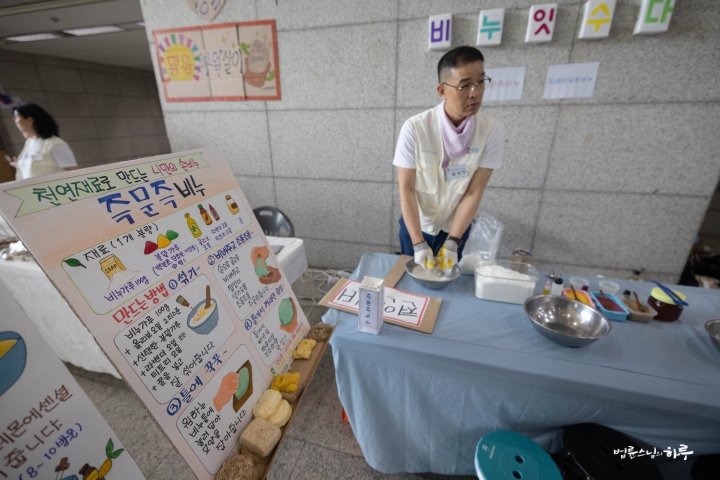
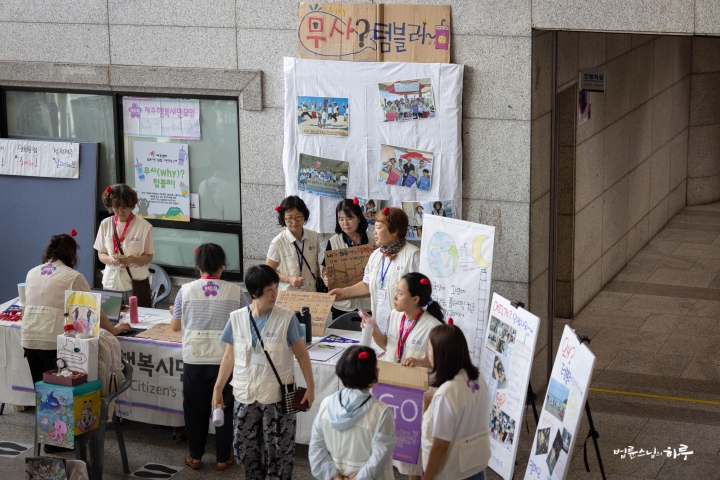
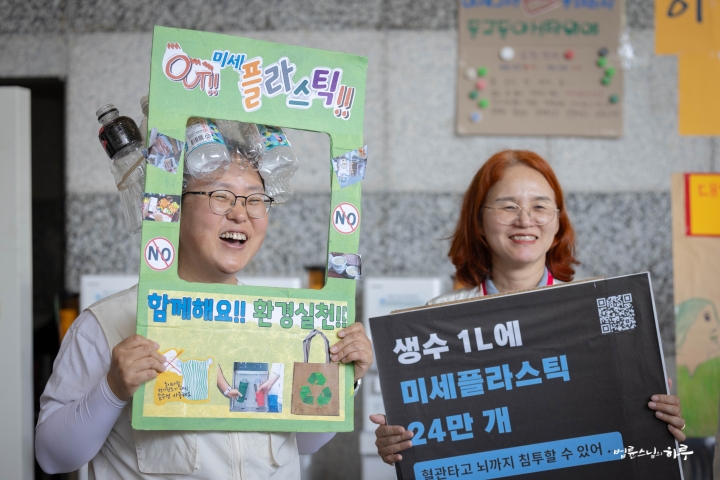
At 2:20 PM, the second part of the program began. Kim Dong-hyun, a Happy Citizen from the Mapo Center, opened the second part joyfully by singing ‘I Am a Butterfly.’
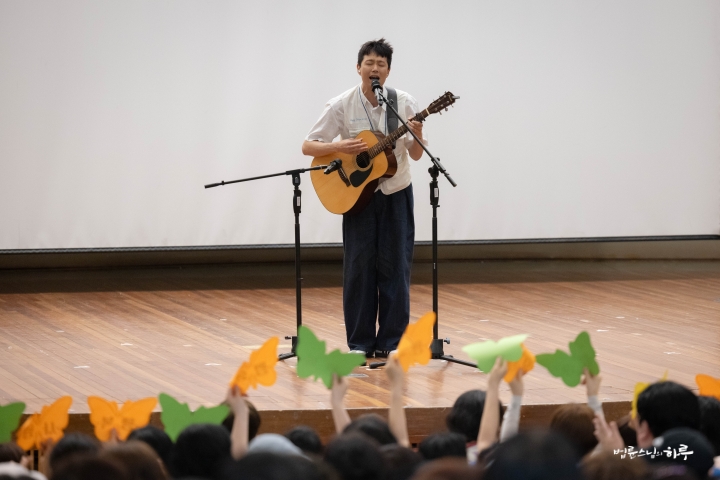
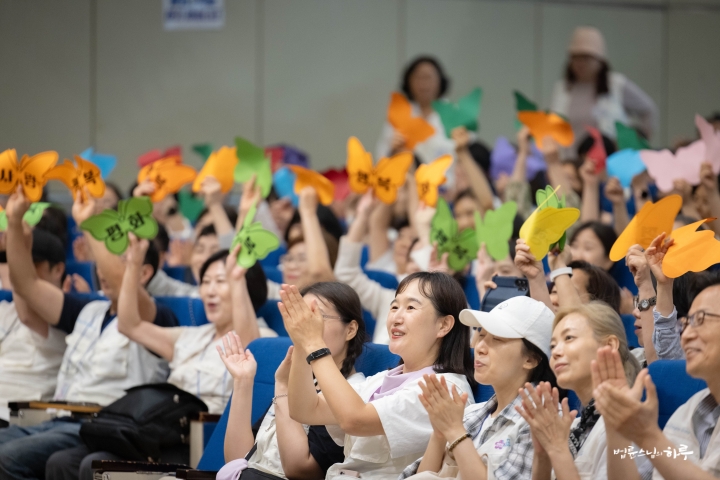
Next, with hearts feeling refreshingly clear, they began the Dharma Q&A session with Venerable Pomnyun Sunim. When the Happy Citizens called out ‘Venerable Pomnyun Sunim’ loudly, Sunim walked onto the stage to thunderous applause.
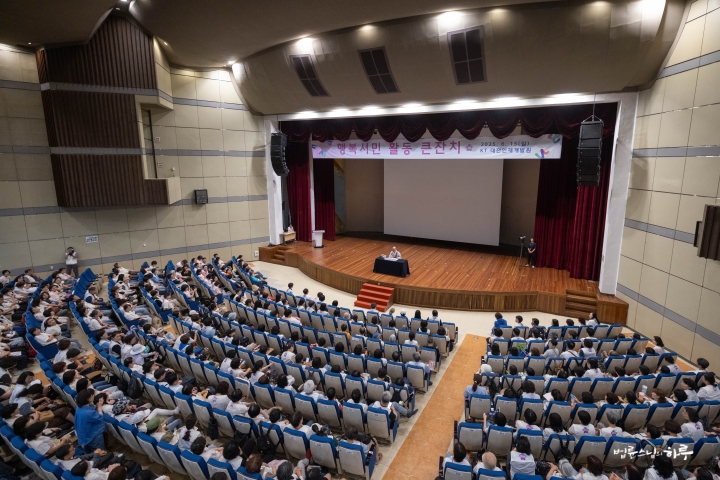
Sunim immediately began taking questions from the Happy Citizens. During the two-hour session, 11 people raised their hands to ask Sunim questions. Sunim provided clear answers to various questions. One person asked for Sunim’s advice on how to restore their relationship with their son, which had recently begun to grow distant.
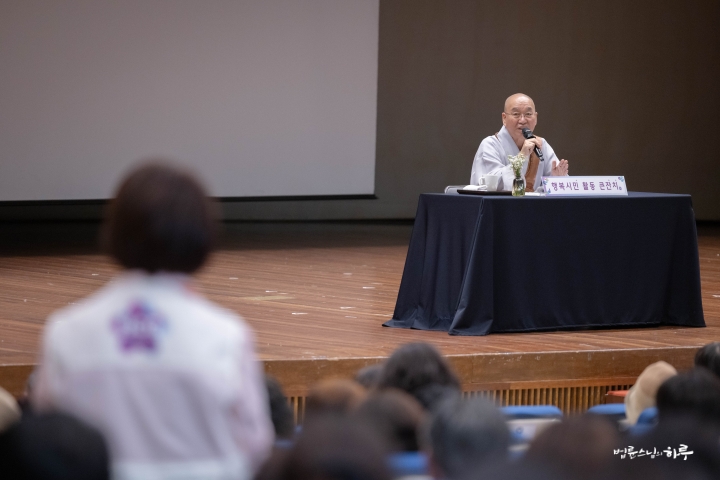
My Relationship with My Son Isn’t What It Used to Be, and It’s Really Hard
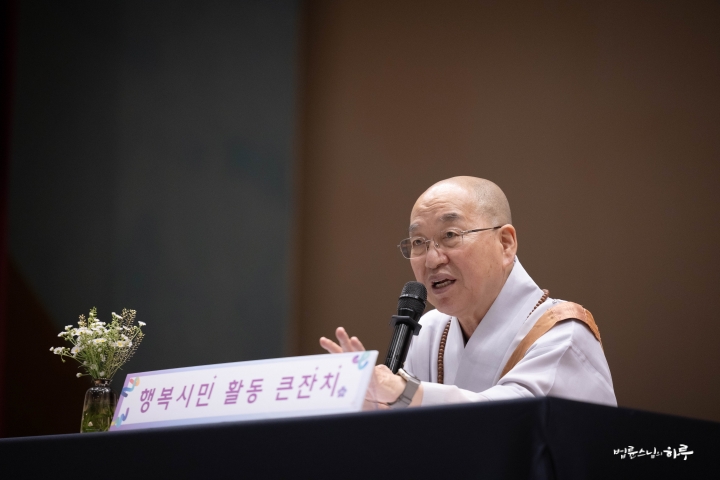
“That’s a very misguided way of thinking. The reason is that you’re in love with someone else’s man. That man already has another woman who loves him, so you should stop loving someone else’s man and love your own man instead.”
“Is that all?”
“Yes, that’s all.” (Laughter)
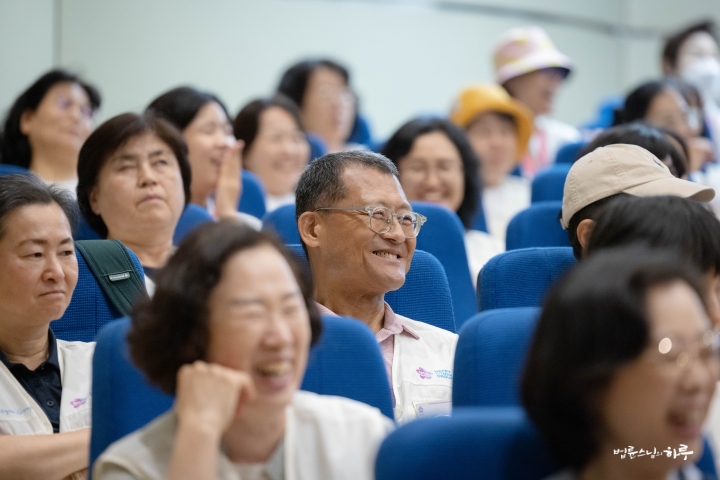
“My son doesn’t even eat with me these days. When I set the table, he just takes his food and goes to eat in his room. He completely rejects me.”
“Of course, it would be nice if a young man were affectionate and communicated well. But what can you do if that man doesn’t like an older woman? There’s nothing you can do.”
“But I’m really serious about this.”
“What’s so serious? I’m telling you to love your own man. Don’t worry so much about your son.”
“Should I just leave him alone then?”
“What else would you do if you don’t leave him alone?”
“Should I completely stop caring?”
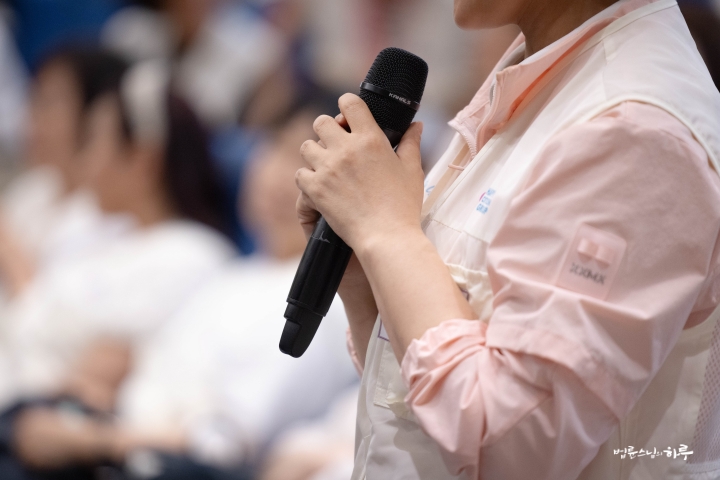
“I’m telling you to pay attention to your own man. Try being nice and affectionate to your husband. Then maybe your son will get jealous and show some interest. If you pay too much attention to your son, he might find it annoying and repulsive. When you think back to when he was young, you interfered and opposed him, so those memories might not be very pleasant.”
“I don’t think that’s the case.”
“You never know. Have you heard that men in their 20s these days tend to be somewhat conservative and right-leaning? It’s not just a backlash against the benefits that women in their 20s receive. There are two psychological factors. First, women in their 40s and 50s are very strong these days. Our generation grew up watching fathers mistreat mothers, so most of us sided with our mothers. But nowadays, mothers have louder voices than fathers, and it’s mainly mothers who interfere. This creates an unconscious resistance to women. Moreover, about 80 percent of elementary school teachers are now women. More than half of middle and high school teachers are also female. When I was in school, except for elementary school, female teachers were rare. Apart from art and music, all teachers were male. Male teachers were the ones who scolded or disciplined students. But today’s children are nagged mainly by women, both at home and at school. This creates an unconscious resentment toward women. However, mothers and female teachers are largely unaware of this.”
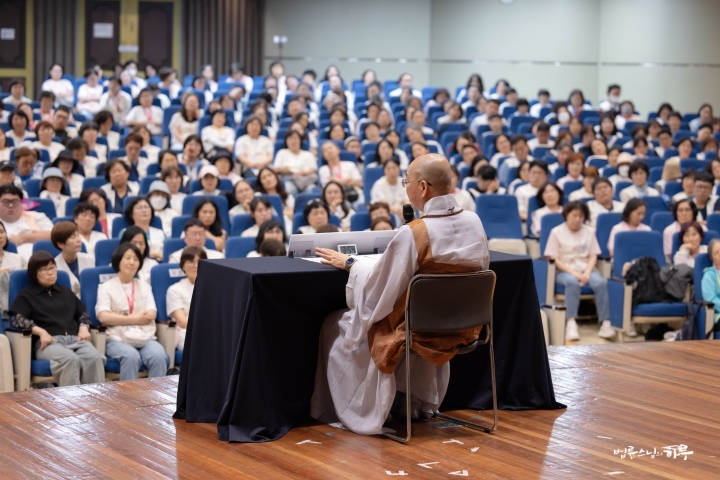
When I have Dharma Q&A sessions with people in their twenties, daughters often struggle because their fathers drink and have fiery tempers, while sons mostly express difficulties in their relationships with their mothers. Also, as children go through puberty, they begin to distinguish between male and female. When they’re young, she’s just mom, but after puberty, they perceive her as a woman. So when mom keeps coming over, hugging and touching them saying they’re cute, it can feel unpleasant, like being sexually harassed. If you do that to a son who’s around middle school age, it constitutes sexual harassment. If a father did that to his daughter, everyone would call it sexual harassment, right? But the problem is that mothers think such behavior is an expression of love. Excessive physical contact should be avoided.
Children at that age develop two types of psychology. One is feeling uncomfortable with physical contact or feeling like it’s sexual harassment, and the other is becoming sensitive to sexual stimulation. If a mother walks around carelessly dressed after showering because she thinks her child is young, that could become sexual stimulation for a pubescent child. So you need to maintain a certain distance and be careful with sons who have passed puberty. But nowadays, parents have almost no awareness of this. That’s why it’s a problem.”
“I didn’t know that.”
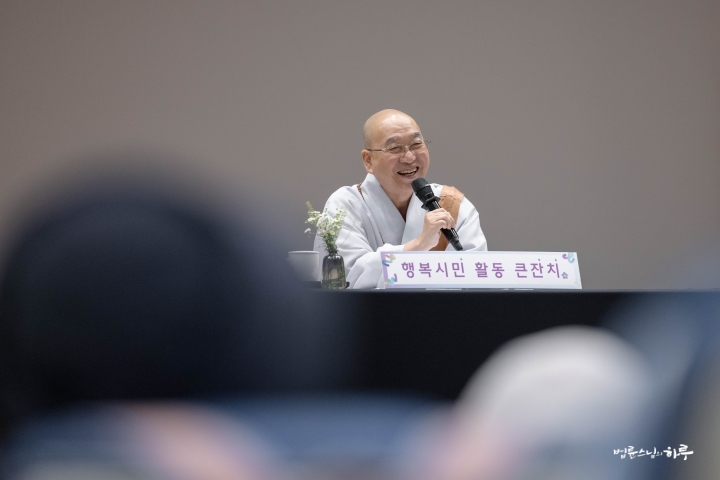
“You still didn’t know that? How ignorant. (laughter) I don’t mean you should do it formally. You need to respect your child appropriately. You can’t treat him like a child. He’s a young man who even served in the Marines, but you keep treating him like a child, so he doesn’t like it. You need to have an attitude of respect, as if you’re dealing with the young man next door.”
“I see. I didn’t know. An attitude of respect, I’ll keep that in mind.”
“But I’m not saying to be indifferent like looking at a cow or chicken. I’m not saying to embrace him like a hen broods her chicks either. Keep your distance, but maintain an attitude of respect.”
“A few days ago, I was talking with a friend and said ‘I need to accept my son,’ and my friend said, ‘A better word for that would be respect, right?’ It’s similar to what you’re saying, Sunim.”
“Are you comparing Sunim to your friend?” (laughter)
“No! That’s not it. Thank you so much for your precious words.”
“Yes, I’m just joking.”
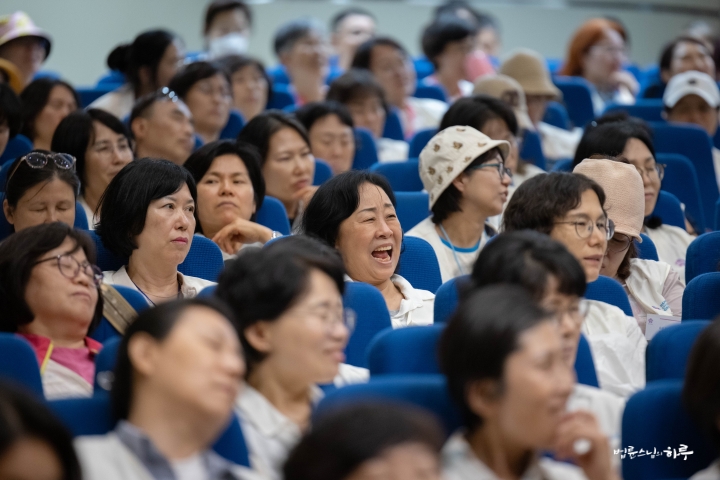
Questions continued one after another. Time flew by as everyone laughed cheerfully, and the conversation ended after 4 PM.
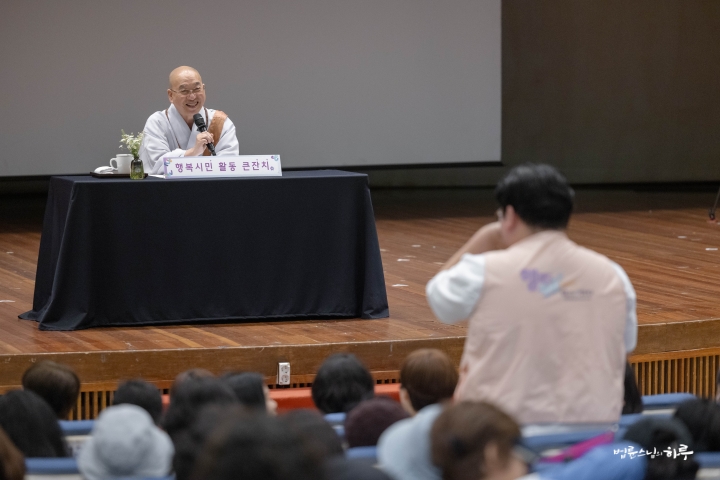
Laughter never ceased throughout the venue all day long. Next, everyone watched a sketch video capturing the joyful and vibrant appearance of the Happy Citizens.
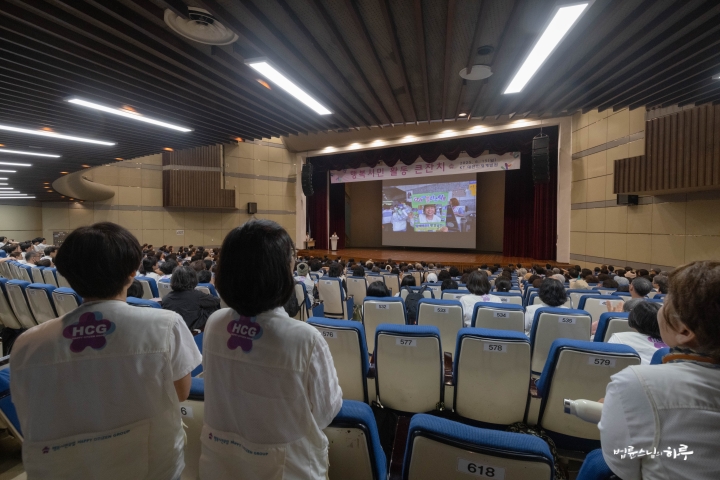
Then Sunim, who had been with the Happy Citizens all day, came back on stage to give closing remarks.
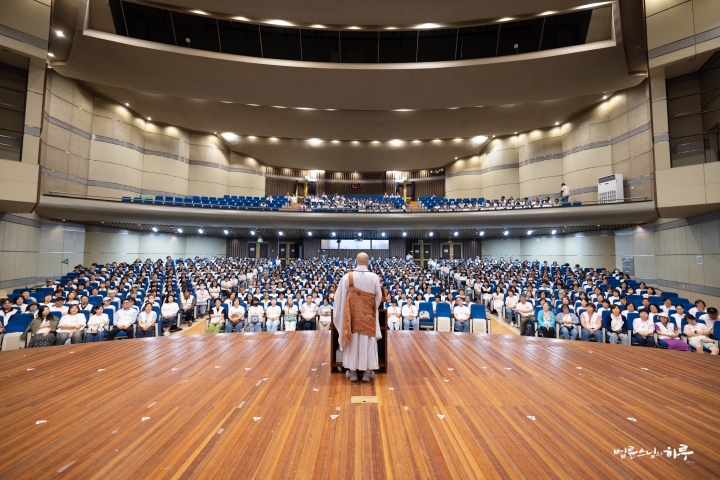
“Did you enjoy today?”
“Yes!”
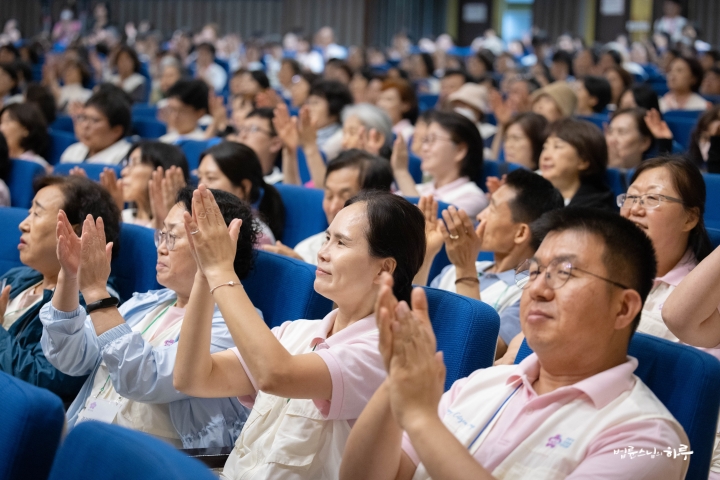
“The current world situation is very chaotic. At its center is the hegemonic competition between the US and China. The US has become deeply dissatisfied that they alone are taking losses, and they are stepping back from their previous stance of defending the world. The purpose of President Trump’s tariff policy is very clear. The position is ‘If you need anything, pay for it yourself.’ Even with allies, if they harm their own interests, they no longer treat them as allies. There’s even an atmosphere where they are more wary of allies than enemies.
Beyond Korea Risk, Living as Global Citizens
The disadvantage of this type of foreign policy is that it can betray trust in pursuit of profit. In the past, relationships between countries were clearly divided into allies or enemies, but now those boundaries have collapsed. America’s view of North Korea used to be that of a clear enemy, but now they don’t see it that way anymore. The distinction between allies and enemies has become blurred.
This change doesn’t only have disadvantages. By approaching relationships with other countries based on ‘what benefits us,’ it has actually opened up possibilities for solving problems that couldn’t be resolved before in new ways. That doesn’t mean Trump’s approach is desirable. Right now, they’re attempting to dismantle the existing world order and establish a new America-centered order. In that process, there’s a danger that war could break out on the Korean Peninsula, but conversely, if things go well, we’re at a turning point where it could be an opportunity to end past wars.
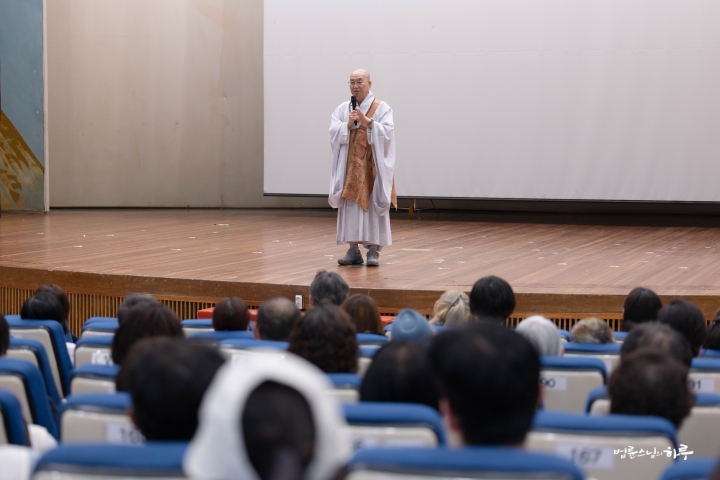
So we shouldn’t just view what’s happening in the world as simply ‘good’ or ‘bad.’ Even in times of war, there are always people who profit from the situation. Similarly, we need to think about how to leverage the changing world order to our advantage. Until now, our country has always carried the burden of being a nation at risk of war – the so-called ‘Korea Risk.’ Now, we must clearly communicate to the international community our stance on peace: ‘There should be no war between North and South Korea.’ At the same time, rather than focusing only on results, we must live as citizens who take action to overcome the climate crisis era. Such people are truly global citizens, and I hope you will become those kinds of people.
What Do We Need to Have Real Positive Influence Beyond the Korean Wave?
These days, the Korean Wave is spreading across the world. You must feel proud about it too. However, the Korean Wave is ultimately a consumer culture. It’s a culture of wearing stylish clothes, singing and dancing, and eating delicious food. In other countries, especially in the eyes of the parent generation, young people getting absorbed in this culture may not look entirely positive. So the Korean Wave doesn’t only have good influences. While it does improve Korea’s image, it doesn’t necessarily bring practical benefits to those countries.
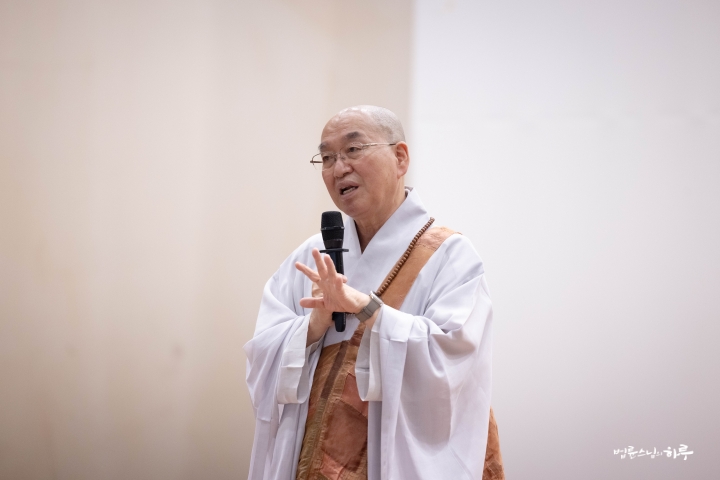
Therefore, if we truly want to have a positive influence, we need to do things that actually help those countries. For example, if women’s education is needed, we should support that area; if they experience natural disasters, we should help with recovery; and we should contribute to the development of democracy. When affection for Korea and practical benefits overlap in this way, the Korean Wave becomes more sustainable. Otherwise, if we only seek our own interests, the Korean Wave may end up as a temporary trend. So at this time when the Korean Wave is spreading globally, we need to be able to provide them with practical help. With our country’s current economic capacity, this is entirely possible.
When we save the cost of one meal, it’s about 10,000 won, right? When that money goes to another country, it can become ten or twenty meals. From this perspective, we need to play our role as global citizens. Of course, it’s true that Korea’s working-class economy is struggling right now. However, compared to other countries, it’s not to the extent that we can say it’s unbearably difficult. Instead of constantly repeating that we’re ‘dying,’ Korean people’s consciousness needs to grow to the next level. I hope all of you become such global citizens and live more mentally comfortable and free lives. I hope we can practice together a life where both we and others are happy.”
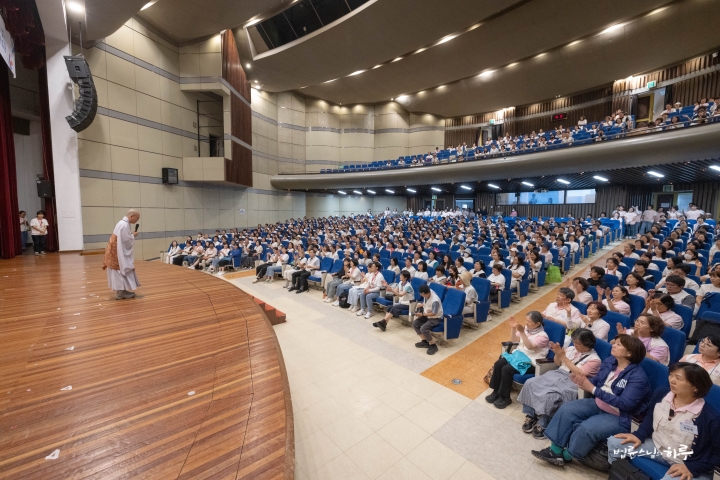
To conclude the Happy Citizens Activity Festival, everyone watched a performance prepared by the Busan-Ulsan Regional Center Alliance. They showed exciting dance moves to the Happiness School logo song. The Happy Citizens in the audience all stood up and danced along. As everyone laughed, clapped, and danced with united hearts, the auditorium was truly filled with happy energy.
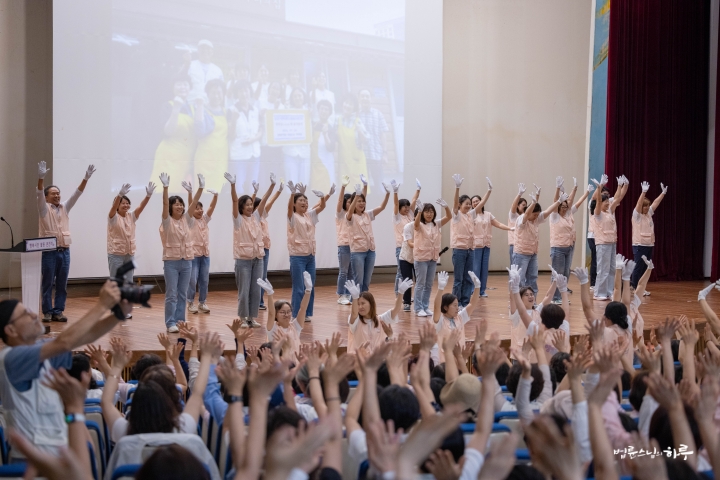
Finally, everyone shouted the Happy Citizens’ slogan “Let’s all be happy together!” three times and concluded the event.
“Let’s all be happy together!”
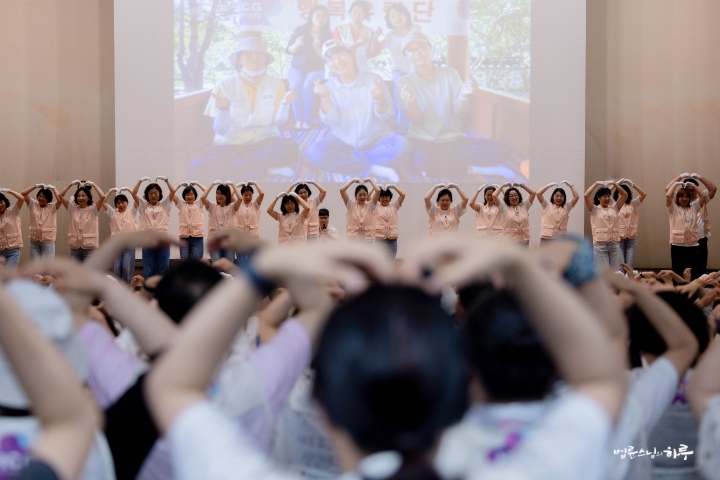
Following the volunteers’ guidance, everyone exited the auditorium, and Sunim got in the car and departed from Daejeon heading to Seoul.
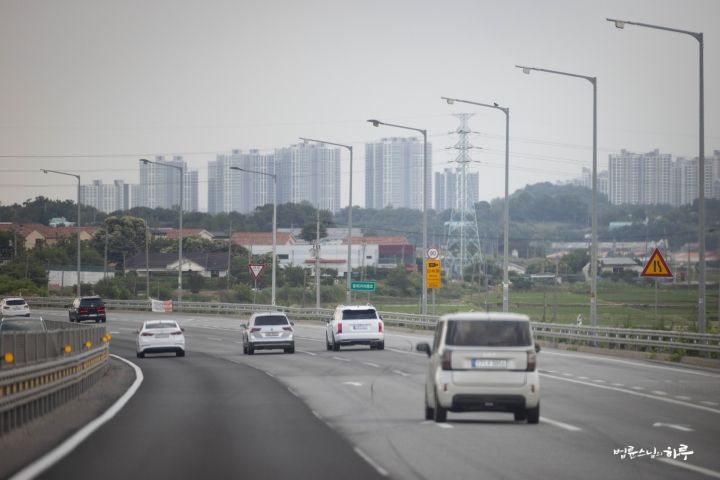
After leaving Daejeon at 5 PM, Sunim briefly stopped in Anyang to visit Dharma Teacher Myohyang, who is battling cancer.
Upon hearing that Dharma Teacher Myohyang had recently stopped chemotherapy and moved to a hospice ward, Sunim made time to visit her personally. Dharma Teacher Myohyang first met Venerable Pomnyun Sunim in 1995 while working with the Busan branch of the University Buddhist Association. She later joined the community while participating in the One Million Signature Campaign to Help North Korean Compatriots, worked at Good Friends, and then served mainly at Jungto Publishing for many years before receiving ordination as a Dharma Teacher. She had been fulfilling her duties until beginning her battle with illness last year.
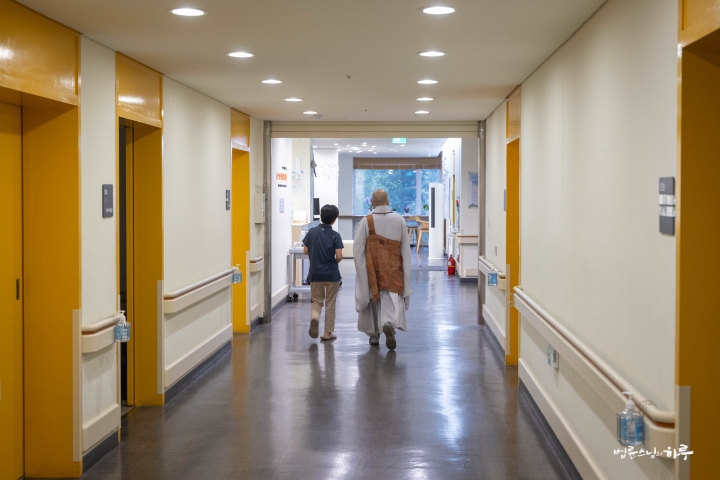
The Dharma Teacher had become very thin due to her inability to properly digest food, and she spoke quietly with great effort.
“I have the desire to eat, but I can’t digest anything, so I can’t eat. The doctor asked if I wanted to try chemotherapy one more time, but I said I wouldn’t do it anymore.”
Sunim quietly comforted the Dharma Teacher. As Sunim asked questions and the Dharma Teacher answered, with Sunim offering the next words with gentle eyes, warm conversation flowed quietly through the hospital room.
“Now let’s leave it to natural healing. If you do chemotherapy, you might just suffer and spend all your time in pain. There’s no need to try to die, and no need to struggle to live. If you just accept what comes naturally, your mind will be a bit more at ease. Even if you live just one day, you should live comfortably. Is the pain severe?”
“The pain isn’t too bad. Since this is a hospice ward, they give me injections when I say I’m in pain. But as my body keeps getting thinner, I can’t sit or stand. Ah, I realized this is what suffering is.”
“It’s fortunate that there’s no pain. The hardest thing is pain. When the pain is severe, each day becomes too agonizing. Since you don’t have strength, try not to talk as much as possible.”
“Thank you. I’m doing well thanks to you, Sunim. I also listened to the 100-Day Dharma Talks in the hospital.”
“How did you listen to the Dharma talks?”
“I watched them diligently on my phone.”
“I’m glad you look a bit more energetic than I worried. Always think ‘I’m fortunate to be this well.’ Then your mind will become more peaceful.”
“Yes, I understand. If my body recovers a bit, I want to see the faces of the Sangha members.”
“I’m going to Japan tomorrow and then to Bhutan. I’ll come see you again after I return from Bhutan. Until then, stay at peace. If you keep your mind at ease, you’ll gradually get better.”
Sunim seemed deeply saddened seeing his disciple battling illness. For a long while, he held her hand tightly without saying anything, conveying deep compassion and warm encouragement.
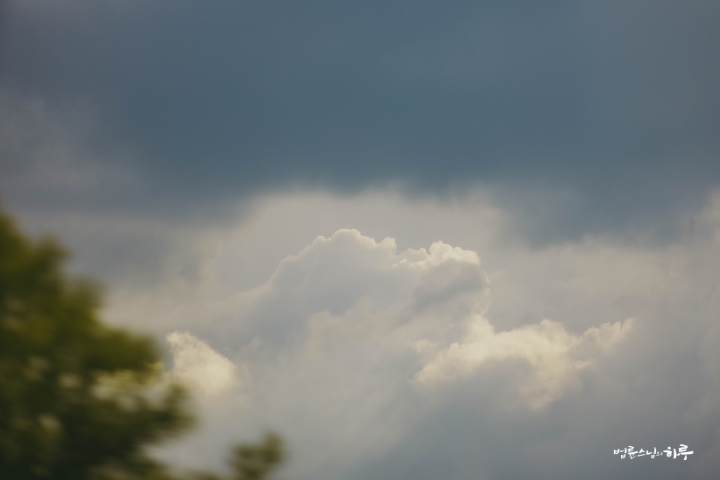
After finishing the hospital visit, Sunim left Anyang at 7 PM and arrived at Seoul Jungto Center at 7:40 PM. After sunset, he worked indoors in the evening, reviewed manuscript corrections, and concluded his day’s activities.
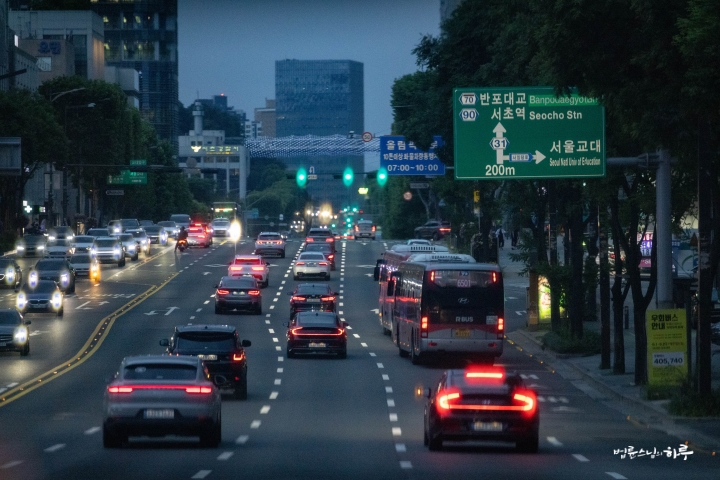
Tomorrow, he will depart early in the morning from Incheon Airport, land at Tokyo Airport in Japan, spend the entire day in dialogue with senior Japanese politicians about improving North Korea-Japan relations, and then board another flight at night to travel to Bhutan.





